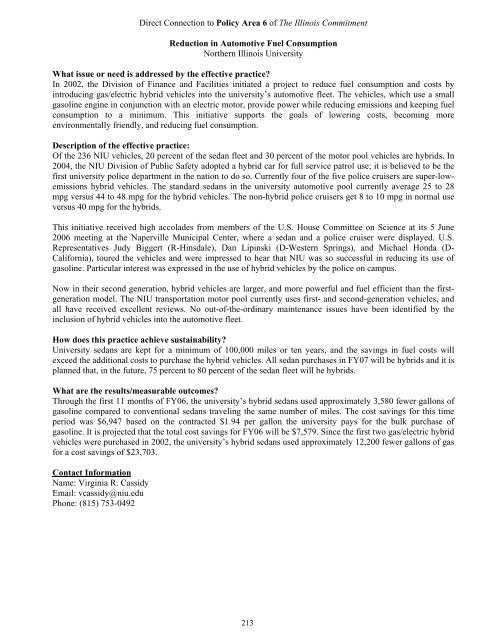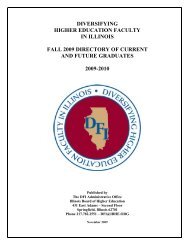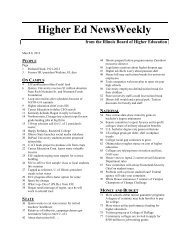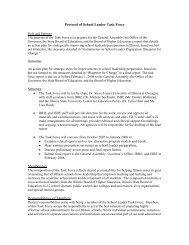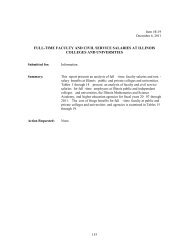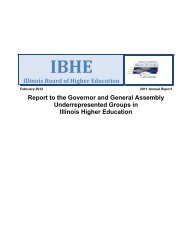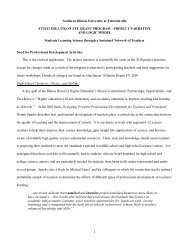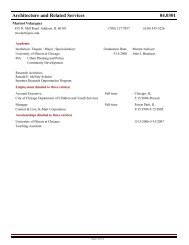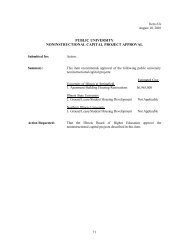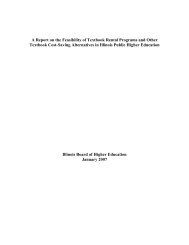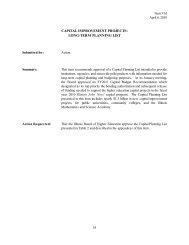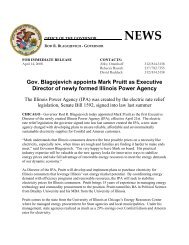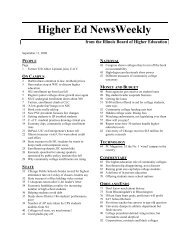Title of Effective Practice: - California Postsecondary Education ...
Title of Effective Practice: - California Postsecondary Education ...
Title of Effective Practice: - California Postsecondary Education ...
You also want an ePaper? Increase the reach of your titles
YUMPU automatically turns print PDFs into web optimized ePapers that Google loves.
Direct Connection to Policy Area 6 <strong>of</strong> The Illinois Commitment<br />
Reduction in Automotive Fuel Consumption<br />
Northern Illinois University<br />
What issue or need is addressed by the effective practice?<br />
In 2002, the Division <strong>of</strong> Finance and Facilities initiated a project to reduce fuel consumption and costs by<br />
introducing gas/electric hybrid vehicles into the university’s automotive fleet. The vehicles, which use a small<br />
gasoline engine in conjunction with an electric motor, provide power while reducing emissions and keeping fuel<br />
consumption to a minimum. This initiative supports the goals <strong>of</strong> lowering costs, becoming more<br />
environmentally friendly, and reducing fuel consumption.<br />
Description <strong>of</strong> the effective practice:<br />
Of the 236 NIU vehicles, 20 percent <strong>of</strong> the sedan fleet and 30 percent <strong>of</strong> the motor pool vehicles are hybrids. In<br />
2004, the NIU Division <strong>of</strong> Public Safety adopted a hybrid car for full service patrol use; it is believed to be the<br />
first university police department in the nation to do so. Currently four <strong>of</strong> the five police cruisers are super-lowemissions<br />
hybrid vehicles. The standard sedans in the university automotive pool currently average 25 to 28<br />
mpg versus 44 to 48 mpg for the hybrid vehicles. The non-hybrid police cruisers get 8 to 10 mpg in normal use<br />
versus 40 mpg for the hybrids.<br />
This initiative received high accolades from members <strong>of</strong> the U.S. House Committee on Science at its 5 June<br />
2006 meeting at the Naperville Municipal Center, where a sedan and a police cruiser were displayed. U.S.<br />
Representatives Judy Biggert (R-Hinsdale), Dan Lipinski (D-Western Springs), and Michael Honda (D-<br />
<strong>California</strong>), toured the vehicles and were impressed to hear that NIU was so successful in reducing its use <strong>of</strong><br />
gasoline. Particular interest was expressed in the use <strong>of</strong> hybrid vehicles by the police on campus.<br />
Now in their second generation, hybrid vehicles are larger, and more powerful and fuel efficient than the firstgeneration<br />
model. The NIU transportation motor pool currently uses first- and second-generation vehicles, and<br />
all have received excellent reviews. No out-<strong>of</strong>-the-ordinary maintenance issues have been identified by the<br />
inclusion <strong>of</strong> hybrid vehicles into the automotive fleet.<br />
How does this practice achieve sustainability?<br />
University sedans are kept for a minimum <strong>of</strong> 100,000 miles or ten years, and the savings in fuel costs will<br />
exceed the additional costs to purchase the hybrid vehicles. All sedan purchases in FY07 will be hybrids and it is<br />
planned that, in the future, 75 percent to 80 percent <strong>of</strong> the sedan fleet will be hybrids.<br />
What are the results/measurable outcomes?<br />
Through the first 11 months <strong>of</strong> FY06, the university’s hybrid sedans used approximately 3,580 fewer gallons <strong>of</strong><br />
gasoline compared to conventional sedans traveling the same number <strong>of</strong> miles. The cost savings for this time<br />
period was $6,947 based on the contracted $1.94 per gallon the university pays for the bulk purchase <strong>of</strong><br />
gasoline. It is projected that the total cost savings for FY06 will be $7,579. Since the first two gas/electric hybrid<br />
vehicles were purchased in 2002, the university’s hybrid sedans used approximately 12,200 fewer gallons <strong>of</strong> gas<br />
for a cost savings <strong>of</strong> $23,703.<br />
Contact Information<br />
Name: Virginia R. Cassidy<br />
Email: vcassidy@niu.edu<br />
Phone: (815) 753-0492<br />
213


